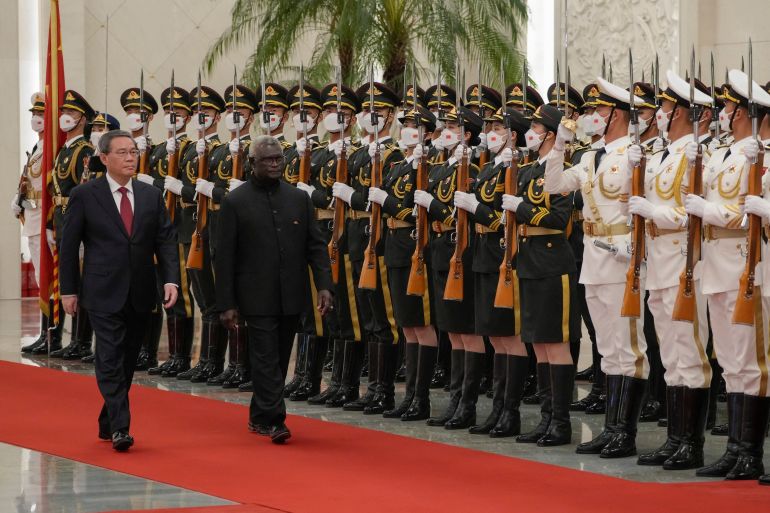Solomon Islands PM Sogavare says won’t put himself forward for new term
Sogavare switched official diplomatic recognition to Beijing from Taipei fuelling controversy in the Pacific island nation.

The Solomon Islands’s incumbent Prime Minister Manasseh Sogavare has said he will not put himself forward as a candidate for the country’s next prime minister.
Parliament is due to sit on Thursday to choose the Pacific island nation’s next leader after his party failed to secure a majority in elections earlier this month.
Keep reading
list of 4 itemsSolomon Islands pro-China PM Manasseh Sogavare fails to secure majority
Solomon Islanders vote in election that could shape ties with China
Solomon Islands prepares for ‘most important election since independence’
Sogavare, who became prime minister in 2019, announced his decision in a televised news conference late on Monday night.
His party named Foreign Minister Jeremiah Manele, who has promised to continue Sogavare’s pro-China policies, its parliamentary leader, in effect its candidate for the premiership.
Four opposition parties have reportedly banded together in a bid for power, with the three-party CARE coalition linking up with the Solomon Islands United Party. They have promised to roll back the pro-Beijing stance of the incumbent government.
MPs will choose the new prime minister in a secret ballot.
Sogavare, who is teetotal and a black belt in karate, has been prime minister on four separate occasions. In announcing his resignation, he said he wanted to thank the people for the “privilege and honour” of serving the country.
Sogavare has been under pressure since he abruptly switched diplomatic relations from Taiwan to China early in his term.
He argued the move brought significant investment from Beijing, but critics said the money should have gone to hospitals and schools rather than sport stadiums.
Riots fuelled by anger over the China switch rocked Honiara in 2021 with Sogavare calling for Australia’s help to end the unrest. Six months later, he agreed to a security pact with Beijing which drew concern among the country’s democratic allies.
Sogavare said his government had been “under pressure from the United States and Western allies” and he had been “accused of many things”.
“Geopolitics is at play, after we made a very important decision in 2019,” he said, referring to the switch in diplomatic recognition.
Sogavare held onto his seat by a narrow margin in the April 17 poll, while his OUR party fell short.
Election results showed OUR won 15 of the 50 seats in parliament, while the opposition CARE coalition has 20. Independents and micro parties won 15 seats, and their support will be the key to reaching the 26 seats needed to form a government.
Sogavare said on Monday his party had support for 28 seats.
Nominations for prime minister close on Tuesday afternoon.